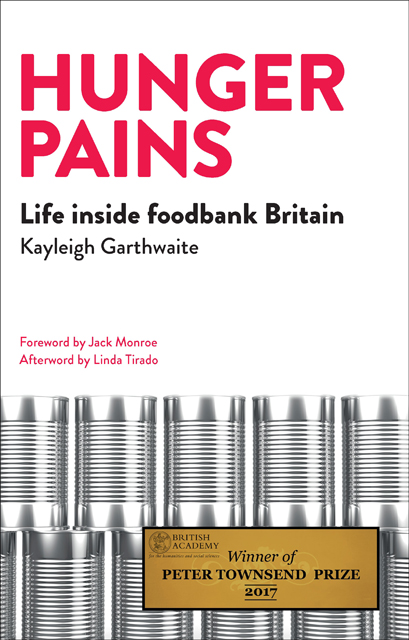Book contents
- Frontmatter
- Dedication
- Contents
- List of figures and boxes
- Acknowledgements
- Foreword by Jack Monroe
- Introduction
- one Researching foodbank use
- two Foodbanks: what do they do?
- three The politics of foodbank use in the UK
- four Why do people use a foodbank?
- five All work, low pay: finding, keeping and doing precarious jobs
- six “Doing the best I can with what I’ve got”: food and health on a low income
- seven Stigma, shame and “people like us”
- Conclusion: is foodbank Britain here to stay?
- Afterword by Linda Tirado
- Notes
- Bibliography
- Index
six - “Doing the best I can with what I’ve got”: food and health on a low income
Published online by Cambridge University Press: 15 April 2023
- Frontmatter
- Dedication
- Contents
- List of figures and boxes
- Acknowledgements
- Foreword by Jack Monroe
- Introduction
- one Researching foodbank use
- two Foodbanks: what do they do?
- three The politics of foodbank use in the UK
- four Why do people use a foodbank?
- five All work, low pay: finding, keeping and doing precarious jobs
- six “Doing the best I can with what I’ve got”: food and health on a low income
- seven Stigma, shame and “people like us”
- Conclusion: is foodbank Britain here to stay?
- Afterword by Linda Tirado
- Notes
- Bibliography
- Index
Summary
Food poverty and insecurity has reached epidemic proportions, with an estimated 4.7 million people in the UK now living in food poverty. Poverty leading to inadequate nutrition is one of the oldest and most serious global health problems. But in 2015, dangerously poor diets led to the shocking return of rickets and gout – diseases of the Victorian age that affect bones and joints – according to the UK Faculty of Public Health. One in five family doctors were asked to refer a patient to a foodbank between 2014 and 2015, with GPs reporting that benefits delays were leaving people without money for food for lengthy periods of time. There are even rare reported cases of people visiting their GP with “sicknesses caused by not eating”. Research has even suggested that asylum seekers may be experiencing absolute poverty at pre-welfare state levels in dietary terms. Evidence from GP surgeries is matched by hospital diagnoses of malnutrition, which nearly doubled in the five years 2009–13. NHS statistics show that 7,366 people were admitted to hospital with a primary or secondary diagnosis of malnutrition between August 2014 and July 2015. Hospital staff have even suggested offering food boxes to patients as they are discharged, amid rising concerns among doctors about malnourishment. In the summer of 2015 the Royal Victoria Infirmary in Newcastle-upon-Tyne began offering food parcels to parents using its neonatal care unit. This dismal situation has been described by academics as a ‘public health emergency’.
As we have already seen, Trussell Trust statistics indicate that the main reasons why people are referred to foodbanks are benefit delays, low income and benefit changes. The Emergency use only report emphasised how, although illness was not the immediate cause of foodbank referral, there was a high prevalence of ill-health among foodbank users, particularly in terms of mental health problems such as depression and anxiety. Food insecurity has serious adverse consequences for the mental, physical and social health of adults and children alike. Liz Dowler, Professor of Food and Social Policy at the University of Warwick, has explained how food insecurity can impact on health:
“Not having enough food is a very private issue. It is a private sector issue. Food production, distribution and even the regulation of food does not involve the government a great deal. It is an issue of private shame.
- Type
- Chapter
- Information
- Hunger PainsLife inside Foodbank Britain, pp. 115 - 134Publisher: Bristol University PressPrint publication year: 2016

